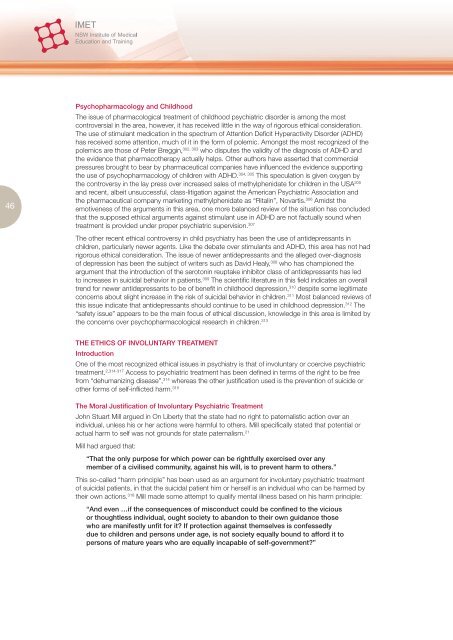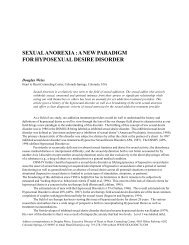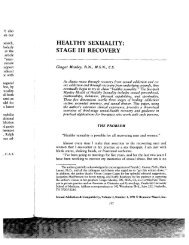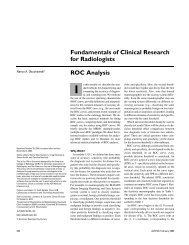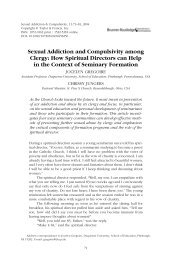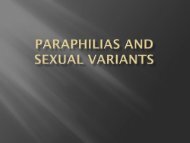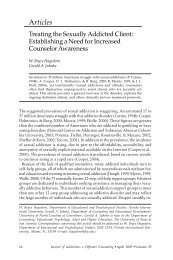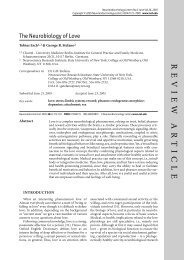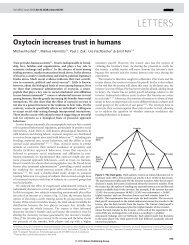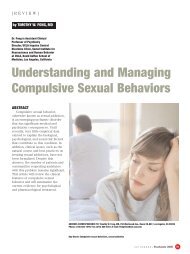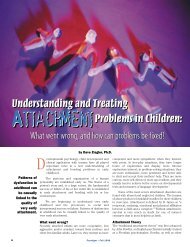46Psychopharmacology and ChildhoodThe issue <strong>of</strong> pharmacological treatment <strong>of</strong> childhood psychiatric disorder is among the mostcontroversial in the area, however, it has received little in the way <strong>of</strong> rigorous ethical consideration.The use <strong>of</strong> stimulant medication in the spectrum <strong>of</strong> Attention Deficit Hyperactivity Disorder (ADHD)has received some attention, much <strong>of</strong> it in the form <strong>of</strong> polemic. Amongst the most recognized <strong>of</strong> thepolemics are those <strong>of</strong> Peter Breggin, 302, 303 who disputes the validity <strong>of</strong> the diagnosis <strong>of</strong> ADHD andthe evidence that pharmacotherapy actually helps. Other authors have asserted that commercialpressures brought to bear by pharmaceutical companies have influenced the evidence supportingthe use <strong>of</strong> psychopharmacology <strong>of</strong> children with ADHD. 304, 305 This speculation is given oxygen bythe controversy in the lay press over increased sales <strong>of</strong> methylphenidate for children in the USA 305and recent, albeit unsuccessful, class-litigation against the American <strong>Psychiatric</strong> Association andthe pharmaceutical company marketing methylphenidate as “Ritalin”, Novartis. 306 Amidst theemotiveness <strong>of</strong> the arguments in this area, one more balanced review <strong>of</strong> the situation has concludedthat the supposed ethical arguments against stimulant use in ADHD are not factually sound whentreatment is provided under proper psychiatric supervision. 307The other recent ethical controversy in child psychiatry has been the use <strong>of</strong> antidepressants inchildren, particularly newer agents. Like the debate over stimulants and ADHD, this area has not hadrigorous ethical consideration. The issue <strong>of</strong> newer antidepressants and the alleged over-diagnosis<strong>of</strong> depression has been the subject <strong>of</strong> writers such as David Healy, 308 who has championed theargument that the introduction <strong>of</strong> the serotonin reuptake inhibitor class <strong>of</strong> antidepressants has ledto increases in suicidal behavior in patients. 309 The scientific literature in this field indicates an overalltrend for newer antidepressants to be <strong>of</strong> benefit in childhood depression, 310 despite some legitimateconcerns about slight increase in the risk <strong>of</strong> suicidal behavior in children. 311 Most balanced reviews <strong>of</strong>this issue indicate that antidepressants should continue to be used in childhood depression. 312 The“safety issue” appears to be the main focus <strong>of</strong> ethical discussion, knowledge in this area is limited bythe concerns over psychopharmacological research in children. 313The <strong>Ethics</strong> <strong>of</strong> Involuntary TreatmentIntroductionOne <strong>of</strong> the most recognized ethical issues in psychiatry is that <strong>of</strong> involuntary or coercive psychiatrictreatment. 2,314-317 Access to psychiatric treatment has been defined in terms <strong>of</strong> the right to be freefrom “dehumanizing disease”, 314 whereas the other justification used is the prevention <strong>of</strong> suicide orother forms <strong>of</strong> self-inflicted harm. 315The Moral Justification <strong>of</strong> Involuntary <strong>Psychiatric</strong> TreatmentJohn Stuart Mill argued in On Liberty that the state had no right to paternalistic action over anindividual, unless his or her actions were harmful to others. Mill specifically stated that potential oractual harm to self was not grounds for state paternalism. 21Mill had argued that:“That the only purpose for which power can be rightfully exercised over anymember <strong>of</strong> a civilised community, against his will, is to prevent harm to others.”This so-called “harm principle” has been used as an argument for involuntary psychiatric treatment<strong>of</strong> suicidal patients, in that the suicidal patient him or herself is an individual who can be harmed bytheir own actions. 318 Mill made some attempt to qualify mental illness based on his harm principle:“<strong>An</strong>d even …if the consequences <strong>of</strong> misconduct could be confined to the viciousor thoughtless individual, ought society to abandon to their own guidance thosewho are manifestly unfit for it? If protection against themselves is confessedlydue to children and persons under age, is not society equally bound to afford it topersons <strong>of</strong> mature years who are equally incapable <strong>of</strong> self-government?”
Applied <strong>Psychiatric</strong> <strong>Ethics</strong>3Whether applied to the dangerous criminal or mentally ill person, the critical issue is harm to othersand not to self. So far, the issue seems straight forward. But Mill seemed to hedge a little, when hewrote:“No person is an entirely isolated being; it is impossible for a person to do anythingseriously or permanently hurtful to himself, without mischief reaching at leastto his near connexions, and <strong>of</strong>ten far beyond them. If he injures his property, hedoes harm to those who directly or indirectly derived support from it, and usuallydiminishes, by a greater or less amount, the general resources <strong>of</strong> the community. Ifhe deteriorates his bodily or mental faculties, he not only brings evil upon all whodepended on him for any portion <strong>of</strong> their happiness, but disqualifies himself forrendering the services which he owes to his fellow-creatures generally; perhapsbecomes a burthen on their affection or benevolence; and if such conduct werevery frequent, hardly any <strong>of</strong>fence that is committed would detract more from thegeneral sum <strong>of</strong> good. Finally, if by his vices or follies a person does no directharm to others, he is nevertheless (it may be said) injurious by his example; andought to be compelled to control himself, for the sake <strong>of</strong> those whom the sight orknowledge <strong>of</strong> his conduct might corrupt or mislead.”47This moved away from the concept <strong>of</strong> a mentally ill person being a danger to himself or others, toone who defaults on personal responsibility. One might reasonably take the view that this appearsto undermine the very liberty Mill sought to establish in his philosophy.In applying Mill’s philosophy to justify paternalistic involuntary psychiatric treatment, thepreconditions to such paternalistic acts are that the individual in question is not responsible for theiractions; the individual’s incompetence is about to cause harm; the “paternalization” will ultimatelyenhance the individual’s competence, and/ or prevent further deterioration and; the “paternalization”takes place in the least restrictive manner. As such, Mill would have supported involuntarypsychiatric treatment. 319Counter to the “harm principle” justification <strong>of</strong> involuntary psychiatric treatment is the “capacityargument”, which posits that the state ought to intervene under the tenets <strong>of</strong> the concept <strong>of</strong>“parens patriae” (father <strong>of</strong> the people). The parens patriae argument defines the paternalistic role<strong>of</strong> the state’s intervention in the lives <strong>of</strong> its incompetent citizens as being one <strong>of</strong> ensuring that suchpeople are able to access treatment or have proxy decisions made for their benefit. In essence,this justification arises from the principle <strong>of</strong> the state providing vicarious autonomous choice for theperson whose mental illness has deprived them <strong>of</strong> such capability.Utilitarianism, communitarianism, and the principle <strong>of</strong> beneficence all, arguably, support the use <strong>of</strong>involuntary psychiatric treatment, 316 although as Chod<strong>of</strong>f has argued in the light <strong>of</strong> human rightsabuses perpetrated under the guise <strong>of</strong> psychiatric treatment, there is a need for a “self critical andchastened” paternalism. 314 Rosenman has argued a method to approach this dilemma. 317 He arguedfor the definition <strong>of</strong> psychiatric disorder along a continuum <strong>of</strong> social definition or biomedical definitionand harmfulness to self or others. In Rosenman’s model, he argues that coercive treatment <strong>of</strong>socially defined disorders occasioning harm is the most problematic ethically.The Obligations <strong>of</strong> Involuntary <strong>Psychiatric</strong> TreatmentOne aspect <strong>of</strong> the ethical implications <strong>of</strong> involuntary treatment is the obligation <strong>of</strong> the state to providea reasonable standard <strong>of</strong> care. As was discussed previously, the level <strong>of</strong> resources for mental healthservices has declined significantly in Australia, yet the scope <strong>of</strong> the potential grounds for psychiatricadmission have broadened. Beyond simple issues <strong>of</strong> fairness or the state’s duty <strong>of</strong> care, thereare specific ethical dilemmas for psychiatrists in the form <strong>of</strong> obligations to the patient subject toinvoluntary treatment. It is well established that chronic exposure to first generation anti-psychoticmedications carries the risk <strong>of</strong> drug-induced movement disorder. More recent observations <strong>of</strong> thepropensity for second-generation antipsychotics to create atherogenic states and convey significantrisks for diabetes and cardiovascular disease emphasize such concerns. Such dilemmas mayrepresent a good example <strong>of</strong> the doctrine <strong>of</strong> double effect. The simple fact that the patient is notIMET AN OVERVIEW OF PSYCHIATRIC ETHICS


